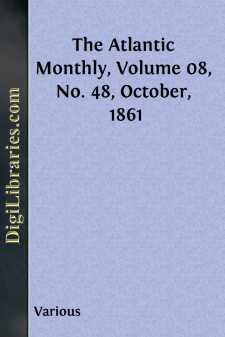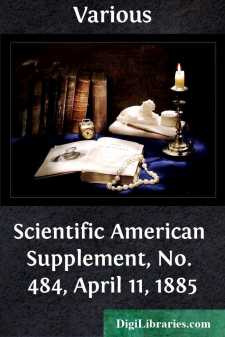Categories
- Antiques & Collectibles 13
- Architecture 36
- Art 48
- Bibles 22
- Biography & Autobiography 813
- Body, Mind & Spirit 142
- Business & Economics 28
- Children's Books 14
- Children's Fiction 11
- Computers 4
- Cooking 94
- Crafts & Hobbies 4
- Drama 346
- Education 46
- Family & Relationships 57
- Fiction 11828
- Games 19
- Gardening 17
- Health & Fitness 34
- History 1377
- House & Home 1
- Humor 147
- Juvenile Fiction 1873
- Juvenile Nonfiction 202
- Language Arts & Disciplines 88
- Law 16
- Literary Collections 686
- Literary Criticism 179
- Mathematics 13
- Medical 41
- Music 40
- Nature 179
- Non-Classifiable 1768
- Performing Arts 7
- Periodicals 1453
- Philosophy 64
- Photography 2
- Poetry 896
- Political Science 203
- Psychology 42
- Reference 154
- Religion 513
- Science 126
- Self-Help 84
- Social Science 81
- Sports & Recreation 34
- Study Aids 3
- Technology & Engineering 59
- Transportation 23
- Travel 463
- True Crime 29
The Atlantic Monthly, Volume 08, No. 48, October, 1861
by: Various
Categories:
Description:
Excerpt
NEAR OXFORD.
On a fine morning in September, we set out on an excursion to Blenheim,—the sculptor and myself being seated on the box of our four-horse carriage, two more of the party in the dicky, and the others less agreeably accommodated inside. We had no coachman, but two postilions in short scarlet jackets and leather breeches with top-boots, each astride of a horse; so that, all the way along, when not otherwise attracted, we had the interesting spectacle of their up-and-down bobbing in the saddle. It was a sunny and beautiful day, a specimen of the perfect English weather, just warm enough for comfort,—indeed, a little too warm, perhaps, in the noontide sun,—yet retaining a mere spice or suspicion of austerity, which made it all the more enjoyable.
The country between Oxford and Blenheim is not particularly interesting, being almost level, or undulating very slightly; nor is Oxfordshire, agriculturally, a rich part of England. We saw one or two hamlets, and I especially remember a picturesque old gabled house at a turnpike-gate, and, altogether, the wayside scenery had an aspect of old-fashioned English life; but there was nothing very memorable till we reached Woodstock, and stopped to water our horses at the Black Bear. This neighborhood is called New Woodstock, but has by no means the brand-new appearance of an American town, being a large village of stone houses, most of them pretty well time-worn and weather-stained. The Black Bear is an ancient inn, large and respectable, with balustraded staircases, and intricate passages and corridors, and queer old pictures and engravings hanging in the entries and apartments. We ordered a lunch (the most delightful of English institutions, next to dinner) to be ready against our return, and then resumed our drive to Blenheim.
The park-gate of Blenheim stands close to the end of the village-street of Woodstock. Immediately on passing through its portals, we saw the stately palace in the distance, but made a wide circuit of the park before approaching it. This noble park contains three thousand acres of land, and is fourteen miles in circumference. Having been, in part, a royal domain before it was granted to the Marlborough family, it contains many trees of unsurpassed antiquity, and has doubtless been the haunt of game and deer for centuries. We saw pheasants in abundance, feeding in the open lawns and glades; and the stags tossed their antlers and bounded away, not affrighted, but only shy and gamesome, as we drove by. It is a magnificent pleasure-ground, not too tamely kept, nor rigidly subjected within rule, but vast enough to have lapsed back into Nature again, after all the pains that the landscape-gardeners of Queen Anne's time bestowed on it, when the domain of Blenheim was scientifically laid out. The great, knotted, slanting trunks of the old oaks do not now look as if man had much intermeddled with their growth and postures. The trees of later date, that were set out in the Great Duke's time, are arranged on the plan of the order of battle in which the illustrious commander ranked his troops at Blenheim; but the ground covered is so extensive, and the trees now so luxuriant, that the spectator is not disagreeably conscious of their standing in military array, as if Orpheus had summoned them together by beat of drum....












